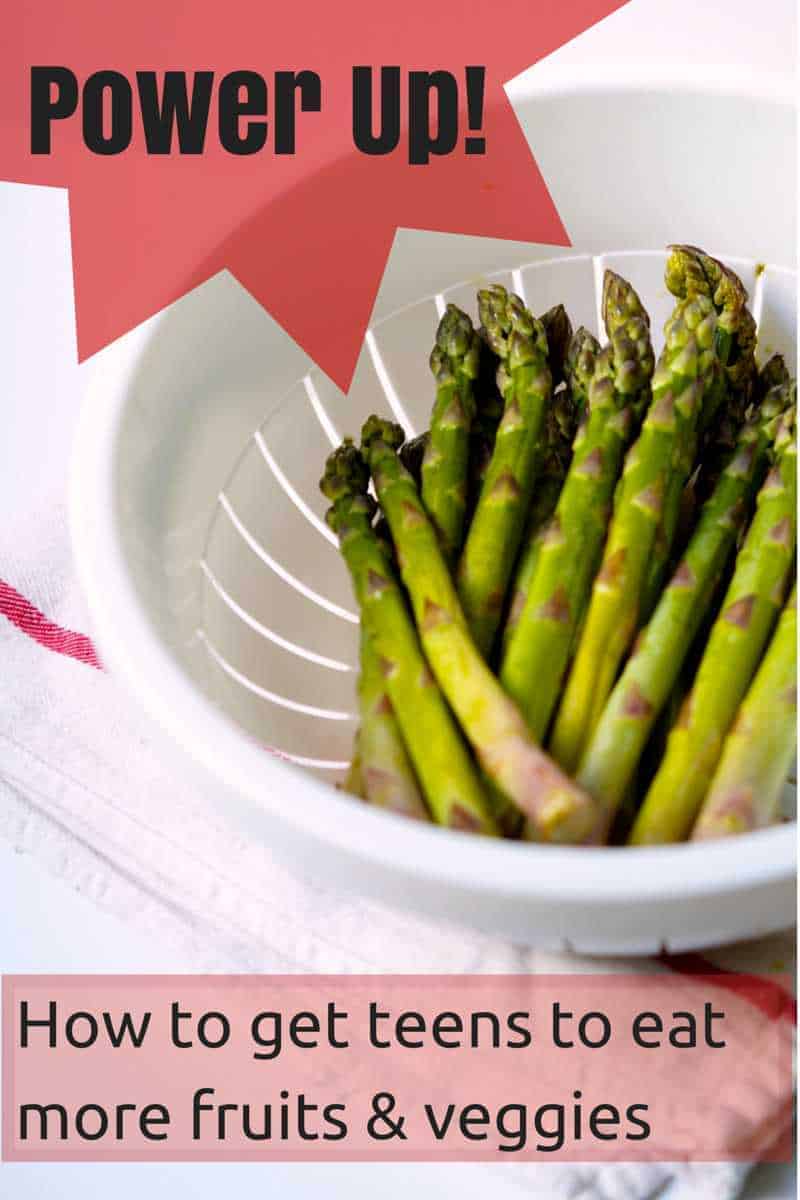
This article originally appeared in the Winnipeg Regional Health Authority’s health and wellness magazine called The Wave when I worked as a Public Health Dietitian. It was published in September 2012.
Power Up
The findings hardly come as a surprise.
According to the Canadian Community Health Survey, more than half of all teenagers eat less than five servings of fruit and vegetables a day. That’s well under the seven or eight servings a day recommended by Eating Well with Canada’s Food Guide.
What might be surprising is that the lack of fruit and vegetable consumption does not appear to be a result of poor nutritional education. Nutrition quizzes show that teens know exactly what healthy eating should look like.
Why then are teens not eating as they know they should be?
A study conducted in Minnesota by Mary Story and Michael Resnick explored the issues preventing kids from making nutritious choices. The three main reasons identified by teens themselves were: busyness, laziness, and the view that healthy eating is something they’ll only need to worry about later in life.
Teens tend to feel invincible, and thinking about long-term health benefits is for people who are not invincible. Teens generally require clear, short-term benefits in order to motivate them to work proper nutrition into their schedules. In other words, they need to be shown how healthy eating can help them live their life the way they want today.
What some teenagers fail to realize is that eating a diet rich in fruits and vegetables can make a difference to their lives right now. This is because fruits and vegetables:
- Provide energy. Fruits and vegetables contain many B vitamins, which are needed as co-enzymes in many energyproducing pathways. As long as the body has enough, it’ll produce all the energy it needs. Adding extra won’t perk teens up, but they will notice a lack of energy if they are deficient.
- Are great sources of fibre, which can help reduce hunger pangs. This prevents overeating, which prevents obesity. An apple a day will provide five grams of fibre. The goal for fibre is 26 grams for teen females and 30 to 38 grams for teen males.
- Are often high in Vitamin C, which can help reduce the duration of a cold. Vitamin C is abundant in citrus fruits, mangoes, red peppers, and strawberries.
- Contain other nutrients needed for healthy hair. Beta-carotene, a precursor for Vitamin A found in bright orange fruits and vegetables, is needed to produce sebum, nature’s hair conditioner.
- Can promote radiant skin. A recent study, conducted by lead researcher Ross Whitehead at the University of St. Andrew’s and involving college kids, found that increasing fruit and vegetable intake by one serving a day resulted in healthier looking skin after only six weeks. The carotenoids in brightly coloured fruits and vegetables, such as watermelon and spinach, are thought to be responsible for this outcome.
Clearly, there are important benefits to eating a healthy diet. So, if you are a teenager looking to enhance your overall health and well-being, why not try to boost your intake of fruits and vegetables? You may be surprised by the results.
The two most important nutrients
The two nutrients that teens are most likely to be low on are iron and calcium.
While girls generally need fewer calories than boys, they need to take in more iron. Academic teens might respond well to hearing that iron is needed for peak brain power, while athletic teens might be motivated by hearing that a deficiency in iron will result in unexplained tiredness and difficulty focusing. Pale skin is another drawback of iron deficiency that many teens will want to avoid.
Calcium needs are at their highest in adolescence. To prevent osteoporosis down the road, it’s important to pack this mineral into bones while they’re still growing. Calcium is needed for muscle contraction so your teen athletes might find some motivation there, but ultimately calcium is a tough one to motivate for unless your teens are unusually interested in their long-term health.
Here are some snack ideas to give a boost in either or both of these two essential nutrients:
Calcium
- Yogurt smoothies with frozen fruit and a pinch of wheat germ
- Veggies and dip made with greek yogurt or cottage cheese
- Sweet chili salmon on whole grain crackers
Iron
- Hummus with red peppers
- Trail mix made with unsalted nuts, seeds, and dried fruit
- Sweet chili salmon on whole grain crackers
- Toasted pumpkin seeds
Your role as a parent
Eating healthy may require more than motivation alone. As parent, you can help make the healthy choice the easy choice.
Consider trying the following:
- Keep plenty of fruits and vegetables in the house.
- Have portable snacks like portioned raw veggies in the fridge.
- Cut up fresh fruits and make bowls of fruit salad.
- Plan and shop with your kids to increase their buy-in regarding the types of fruits and vegetable you purchase.
Here are some other tips to help caring parents support healthy eating in the teen years:
- Don’t nag your kids to eat healthy because it’s not going to work. The teen years are marked by a drive for autonomy. This is often a time when teens take on a particular eating style such as vegetarianism. Support your child’s decision by taking an active role in helping them learn how to make healthy choices within their chosen diet. A great resource for vegetarianism is the book Becoming Vegetarian
written by Registered Dietitians Vesanto Melina and Brenda Davis.
- Teach children from a young age what healthy eating looks like and why it’s important to make nutritious choices. Messages such as “we drink milk because it helps bones grow strong” will demonstrate the value in food choices.
- Model healthy behaviours yourself. It is well known that children imitate what their parents do. This trait doesn’t stop at adolescence. Make it a priority to eat healthy, together as a family.
- Involve teens in meal planning and preparation. You’ll increase buy-in if they feel they have a say. If your child has enough experience in the kitchen, why not allow them to plan and cook a meal on their own for the whole family?




My 13 year old daughter refuses to ear anything but carbs and fat. We have balanced food choices for meals. I provide options for healthy snacks and don’t have junk food in the pantry. She will ear raw carrots but only to use as a scoop for veggie dip ( she won’t eat hummus). For anything I have prepared, she will remove whatever looks like a vegetable. My husband and I model good eating habits. She doesn’t care. She is gaining more and more weight. I am at a loss what to do. You probably get hundreds of requests but please answer this one. I keep reading articles but none really provide an answer to our dilemma. Help!!
Oh Mindy, that can be so challenging! I would recommend working with a Dietitian who can do a complete nutritional assessment and create a plan tailored specifically for you and daughter!